EC
-
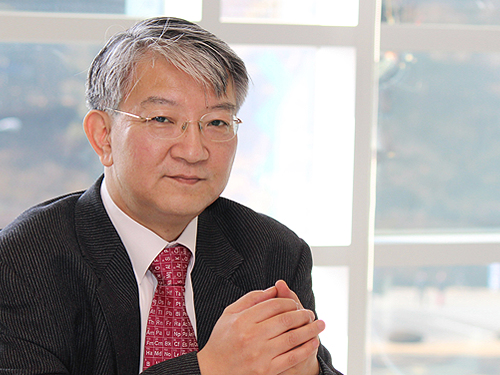 Distinguished Professor Lee Named International Fellow of the CAS
Distinguished Professor Sang Yup Lee from the Department of Chemical and Biomolecular Engineering at KAIST was awarded the title of distinguished professor and international fellow from the Chinese Academy of Sciences (CAS), and honorary professor from its affiliated organization the Tianjin Institute of Industrial Biotechnology (TIB).
The CAS recognized Distinguished Professor Lee for his significant contributions to biotechnology. He has made significant pioneering academic achievements in the area of systems metabolic engineering, which produces useful chemicals from microorganisms. Not only did he develop the first and best source technology in that field, but also came out with processes for the production of biofuel and environmentally-friendly chemicals.”
As a global leader in systems metabolic engineering, Distinguished Professor Lee has also been appointed as an honorary professor at Jiangnan University in Wuxi, China.
Distinguished Professor Lee was listed in the ‘Top 20 Translational Researchers of 2014’ selected by the renowned international journal Nature Biotechnology. Moreover, he was the first Asian recipient of the James E. Bailey Award in 2016 and Marvin J. Johnson Award in 2012, which are given to scholars in the field of biotechnology.
He is also one of 13 global scientists who are foreign members of the renowned academic societies the National Academy of Engineering and the National Academy of Sciences in the US. Furthermore, he received the ‘2017 Korea Best Scientist Award’ from the president of Korea in July. Finally, his founding field, systems metabolic engineering, was chosen as one of the ‘Top 10 Emerging Technologies of 2016’ by the World Economic Forum.
The Chinese Academy of Sciences, established in November 1949, is an academic organization that carries out research on basic sciences and natural sciences in China. It defined its science and technology system to include the fields of basic sciences, natural sciences, and high technology. While having a base in Beijing, its branch academies are located in 12 main cities along with 117 affiliates and 100 national key labs.
2017.10.26 View 12978
Distinguished Professor Lee Named International Fellow of the CAS
Distinguished Professor Sang Yup Lee from the Department of Chemical and Biomolecular Engineering at KAIST was awarded the title of distinguished professor and international fellow from the Chinese Academy of Sciences (CAS), and honorary professor from its affiliated organization the Tianjin Institute of Industrial Biotechnology (TIB).
The CAS recognized Distinguished Professor Lee for his significant contributions to biotechnology. He has made significant pioneering academic achievements in the area of systems metabolic engineering, which produces useful chemicals from microorganisms. Not only did he develop the first and best source technology in that field, but also came out with processes for the production of biofuel and environmentally-friendly chemicals.”
As a global leader in systems metabolic engineering, Distinguished Professor Lee has also been appointed as an honorary professor at Jiangnan University in Wuxi, China.
Distinguished Professor Lee was listed in the ‘Top 20 Translational Researchers of 2014’ selected by the renowned international journal Nature Biotechnology. Moreover, he was the first Asian recipient of the James E. Bailey Award in 2016 and Marvin J. Johnson Award in 2012, which are given to scholars in the field of biotechnology.
He is also one of 13 global scientists who are foreign members of the renowned academic societies the National Academy of Engineering and the National Academy of Sciences in the US. Furthermore, he received the ‘2017 Korea Best Scientist Award’ from the president of Korea in July. Finally, his founding field, systems metabolic engineering, was chosen as one of the ‘Top 10 Emerging Technologies of 2016’ by the World Economic Forum.
The Chinese Academy of Sciences, established in November 1949, is an academic organization that carries out research on basic sciences and natural sciences in China. It defined its science and technology system to include the fields of basic sciences, natural sciences, and high technology. While having a base in Beijing, its branch academies are located in 12 main cities along with 117 affiliates and 100 national key labs.
2017.10.26 View 12978 -
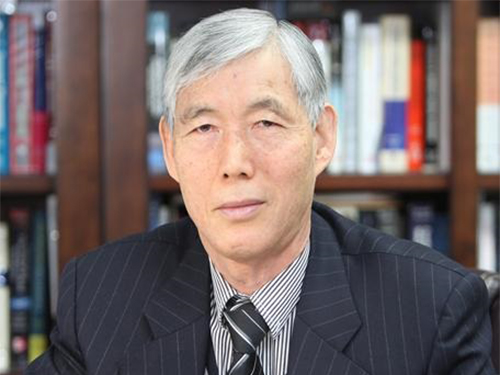 Professor Dai Gil Lee Recognized by the ICCS
Emeritus Professor Dai Gil Lee, from the School of Mechanical and Aerospace Engineering at KAIST, received a special achievement award from the 20th International Conference on Composite Structures (ICCS).
ICCS is a renowned conference in the field of applied composite structures, which highlights the practicality of composite structures. This year, the conference was held at the Conservatoire National des Arts et Métiers (CNAM), Paris, France from September 4 to 7. Approximately 650 papers were presented from 45 countries.
Especially, the conference honored Emeritus Professor Lee, who has been engaged in ICCS since 1993 and received best paper award twice. The ICCS recognized him for serving with distinction in science and technology in the fields of composite materials and structures. As a member of the Editorial Board for many years, he gave significant support to the journal Composite Structures. At the conference, he gave a special lecture titled ‘Lightweight Carbon Composite Proton Exchange Membrane Fuel Cells’.
Professor Lee said, “I will dedicate myself to innovate Vanadium Redox Flow Battery-ESS (VRFB) based on the research findings announced at the conference and related patents. I am hoping that these efforts will contribute to solving energy issues around the world.”
2017.10.19 View 9056
Professor Dai Gil Lee Recognized by the ICCS
Emeritus Professor Dai Gil Lee, from the School of Mechanical and Aerospace Engineering at KAIST, received a special achievement award from the 20th International Conference on Composite Structures (ICCS).
ICCS is a renowned conference in the field of applied composite structures, which highlights the practicality of composite structures. This year, the conference was held at the Conservatoire National des Arts et Métiers (CNAM), Paris, France from September 4 to 7. Approximately 650 papers were presented from 45 countries.
Especially, the conference honored Emeritus Professor Lee, who has been engaged in ICCS since 1993 and received best paper award twice. The ICCS recognized him for serving with distinction in science and technology in the fields of composite materials and structures. As a member of the Editorial Board for many years, he gave significant support to the journal Composite Structures. At the conference, he gave a special lecture titled ‘Lightweight Carbon Composite Proton Exchange Membrane Fuel Cells’.
Professor Lee said, “I will dedicate myself to innovate Vanadium Redox Flow Battery-ESS (VRFB) based on the research findings announced at the conference and related patents. I am hoping that these efforts will contribute to solving energy issues around the world.”
2017.10.19 View 9056 -
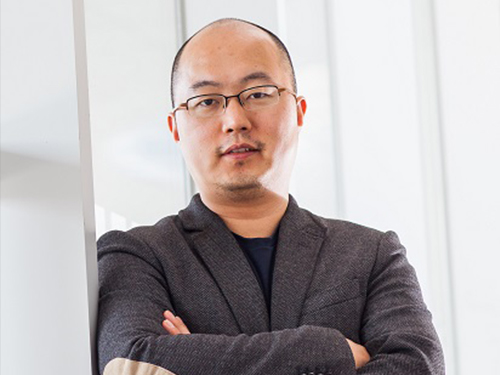 Professor YongKeun Park Elected as a Fellow of the Optical Society
Professor YongKeun Park, from the Department of Physics at KAIST, was elected as a fellow member of the Optical Society (OSA) in Washington, D.C. on September 12. Fellow membership is given to members who have made a significant contribution to the advancement of optics and photonics.
Professor Park was recognized for his research on digital holography and wavefront control technology.
Professor Park has been producing outstanding research outcomes in the field of holographic technology and light scattering control since joining KAIST in 2010. In particular, he developed and commercialized technology for a holographic telescope. He applied it to various medical and biological research projects, leading the field worldwide.
In the past, cells needed to be dyed with fluorescent materials to capture a 3-D image. However, Professor Park’s holotomography (HT) technology can capture 3-D images of living cells and tissues in real time without color dyeing. This technology allows diversified research in the biological and medical field.
Professor Park established a company, Tomocube, Inc. in 2015 to commercialize the technology. In 2016, he received funding from SoftBank Ventures and Hanmi Pharmaceutical. Currently, major institutes, including MIT, the University of Pittsburgh, the German Cancer Research Center, and Seoul National University Hospital are using his equipment.
Recently, Professor Park and his team developed technology based on light scattering measurements. With this technology, they established a company called The Wave Talk and received funding from various organizations, such as NAVER. Its first product is about to be released.
Professor Park said, “I am glad to become a fellow member based on the research outcomes I produced since I was appointed as a professor at KAIST. I would like to thank the excellent researchers as well as the school for its support. I will devote myself to continuously producing novel outcomes in both basic and applied fields.”
Professor Park has published nearly 100 papers in renowned journals including Nature Photonics, Nature Communications, Science Advances, and Physical Review Letters.
2017.10.18 View 13562
Professor YongKeun Park Elected as a Fellow of the Optical Society
Professor YongKeun Park, from the Department of Physics at KAIST, was elected as a fellow member of the Optical Society (OSA) in Washington, D.C. on September 12. Fellow membership is given to members who have made a significant contribution to the advancement of optics and photonics.
Professor Park was recognized for his research on digital holography and wavefront control technology.
Professor Park has been producing outstanding research outcomes in the field of holographic technology and light scattering control since joining KAIST in 2010. In particular, he developed and commercialized technology for a holographic telescope. He applied it to various medical and biological research projects, leading the field worldwide.
In the past, cells needed to be dyed with fluorescent materials to capture a 3-D image. However, Professor Park’s holotomography (HT) technology can capture 3-D images of living cells and tissues in real time without color dyeing. This technology allows diversified research in the biological and medical field.
Professor Park established a company, Tomocube, Inc. in 2015 to commercialize the technology. In 2016, he received funding from SoftBank Ventures and Hanmi Pharmaceutical. Currently, major institutes, including MIT, the University of Pittsburgh, the German Cancer Research Center, and Seoul National University Hospital are using his equipment.
Recently, Professor Park and his team developed technology based on light scattering measurements. With this technology, they established a company called The Wave Talk and received funding from various organizations, such as NAVER. Its first product is about to be released.
Professor Park said, “I am glad to become a fellow member based on the research outcomes I produced since I was appointed as a professor at KAIST. I would like to thank the excellent researchers as well as the school for its support. I will devote myself to continuously producing novel outcomes in both basic and applied fields.”
Professor Park has published nearly 100 papers in renowned journals including Nature Photonics, Nature Communications, Science Advances, and Physical Review Letters.
2017.10.18 View 13562 -
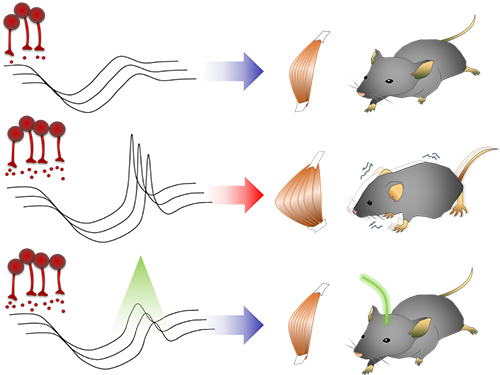 Unlocking the Keys to Parkinson's Disease
A KAIST research team has identified a new mechanism that causes the hallmark symptoms of Parkinson’s disease, namely tremors, rigidity, and loss of voluntary movement.
The discovery, made in collaboration with Nanyang Technological University in Singapore, presents a new perspective to three decades of conventional wisdom in Parkinson’s disease research. It also opens up new avenues that can help alleviate the motor problems suffered by patients of the disease, which reportedly number more than 10 million worldwide. The research was published in Neuron on August 30.
The research team was led by Professor Daesoo Kim from the Department of Biological Sciences at KAIST and Professor George Augustine from the Lee Kong Chian School of Medicine at NTU. Dr. Jeongjin Kim, a former postdoctoral fellow at KAIST who now works at the Korea Institute of Science and Technology (KIST), is the lead author.
It is known that Parkinson’s disease is caused by a lack of dopamine, a chemical in the brain that transmits neural signals. However, it remains unknown how the disease causes the motor
Smooth, voluntary movements, such as reaching for a cup of coffee, are controlled by the basal ganglia, which issue instructions via neurons (nerve cells that process and transmit information in the brain) in the thalamus to the cortex. These instructions come in two types: one that triggers a response (excitatory signals) and the other that suppresses a response (inhibitory signals). Proper balance between the two controls movement.
A low level of dopamine causes the basal ganglia to severely inhibit target neurons in the thalamus, called an inhibition. Scientists have long assumed that this stronger inhibition causes the motor problems of Parkinson’s disease patients.
To test this assumption, the research team used optogenetic technology in an animal model to study the effects of this increased inhibition of the thalamus and ultimately movement. Optogenetics is the use of light to control the activity of specific types of neurons within the brain.
They found that when signals from the basal ganglia are more strongly activated by light, the target neurons in the thalamus paradoxically became hyperactive. Called rebound excitation, this hyperactivity produced abnormal muscular stiffness and tremor. Such motor problems are very similar to the symptoms of Parkinson’s disease patients. When this hyperactivity of thalamic neurons is suppressed by light, mice show normal movments without Parkinson’s disease symptoms. Reducing the levels of activity back to normal caused the motor symptoms to stop, proving that the hyperactivity caused the motor problems experienced by Parkinson’s disease patients.
Professor Kim at KAIST said, “This study overturns three decades of consensus on the provenance of Parkinsonian symptoms.” The lead author, Dr Jeongjin Kim said, “The therapeutic implications of this study for the treatment of Parkinsonian symptoms are profound. It may soon become possible to remedy movement disorders without using L-DOPA, a pre-cursor to dopamine.”
Professor Augustine at NTU added, “Our findings are a breakthrough, both for understanding how the brain normally controls the movement of our body and how this control goes awry during Parkinson’s disease and related dopamine-deficiency disorders.”
The study took five years to complete, and includes researchers from the Department of Bio & Brain Engineering at KAIST.
The research team will move forward by investigating how hyperactivity in neurons in the thalamus leads to abnormal movement, as well as developing therapeutic strategies for the disease by targeting this neural mechanism.
Figure abstract: Inhibitory inputs from the basal ganglia inhibit thalamic neurons (upper). In low-dopamine states, like PD, rebound firing follows inhibition and causes movement disorders (middle). The inhibition of rebound firing alleviates PD-like symptoms in a mouse model of PD.
2017.09.22 View 11187
Unlocking the Keys to Parkinson's Disease
A KAIST research team has identified a new mechanism that causes the hallmark symptoms of Parkinson’s disease, namely tremors, rigidity, and loss of voluntary movement.
The discovery, made in collaboration with Nanyang Technological University in Singapore, presents a new perspective to three decades of conventional wisdom in Parkinson’s disease research. It also opens up new avenues that can help alleviate the motor problems suffered by patients of the disease, which reportedly number more than 10 million worldwide. The research was published in Neuron on August 30.
The research team was led by Professor Daesoo Kim from the Department of Biological Sciences at KAIST and Professor George Augustine from the Lee Kong Chian School of Medicine at NTU. Dr. Jeongjin Kim, a former postdoctoral fellow at KAIST who now works at the Korea Institute of Science and Technology (KIST), is the lead author.
It is known that Parkinson’s disease is caused by a lack of dopamine, a chemical in the brain that transmits neural signals. However, it remains unknown how the disease causes the motor
Smooth, voluntary movements, such as reaching for a cup of coffee, are controlled by the basal ganglia, which issue instructions via neurons (nerve cells that process and transmit information in the brain) in the thalamus to the cortex. These instructions come in two types: one that triggers a response (excitatory signals) and the other that suppresses a response (inhibitory signals). Proper balance between the two controls movement.
A low level of dopamine causes the basal ganglia to severely inhibit target neurons in the thalamus, called an inhibition. Scientists have long assumed that this stronger inhibition causes the motor problems of Parkinson’s disease patients.
To test this assumption, the research team used optogenetic technology in an animal model to study the effects of this increased inhibition of the thalamus and ultimately movement. Optogenetics is the use of light to control the activity of specific types of neurons within the brain.
They found that when signals from the basal ganglia are more strongly activated by light, the target neurons in the thalamus paradoxically became hyperactive. Called rebound excitation, this hyperactivity produced abnormal muscular stiffness and tremor. Such motor problems are very similar to the symptoms of Parkinson’s disease patients. When this hyperactivity of thalamic neurons is suppressed by light, mice show normal movments without Parkinson’s disease symptoms. Reducing the levels of activity back to normal caused the motor symptoms to stop, proving that the hyperactivity caused the motor problems experienced by Parkinson’s disease patients.
Professor Kim at KAIST said, “This study overturns three decades of consensus on the provenance of Parkinsonian symptoms.” The lead author, Dr Jeongjin Kim said, “The therapeutic implications of this study for the treatment of Parkinsonian symptoms are profound. It may soon become possible to remedy movement disorders without using L-DOPA, a pre-cursor to dopamine.”
Professor Augustine at NTU added, “Our findings are a breakthrough, both for understanding how the brain normally controls the movement of our body and how this control goes awry during Parkinson’s disease and related dopamine-deficiency disorders.”
The study took five years to complete, and includes researchers from the Department of Bio & Brain Engineering at KAIST.
The research team will move forward by investigating how hyperactivity in neurons in the thalamus leads to abnormal movement, as well as developing therapeutic strategies for the disease by targeting this neural mechanism.
Figure abstract: Inhibitory inputs from the basal ganglia inhibit thalamic neurons (upper). In low-dopamine states, like PD, rebound firing follows inhibition and causes movement disorders (middle). The inhibition of rebound firing alleviates PD-like symptoms in a mouse model of PD.
2017.09.22 View 11187 -
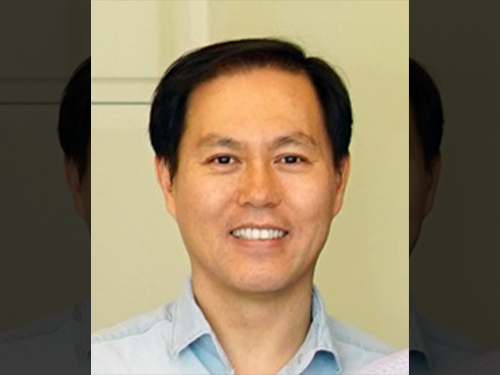 Professor Jin Woo Kim Wins the 14th Macrogen Scientist Award
Professor Jin Woo Kim of the Department of Biological Sciences at KAIST received the 14th Macrogen Scientist Award at the 2017 KSMCB International Conference held in COEX on September 12, 2017.
The award is given by the Korean Society for Molecular and Cellular Biology (KSMCB) and sponsored by Macrogen, a service provider of genome research. The award was established in 2004 to recognize biological scientists who have accomplished excellent performance in the field of basic life sciences.
Professor Kim has achieved outstanding research performances on nerve development, such as identifying the cause of senile retinal degenerative disease and finding retinal nerve cells that distinguish light and darkness in dark conditions.
Recently, he discovered intercellular communication, which controls the development of retinal neurons. His findings have contributed to addressing the principles of maintenance and regeneration of retinal neurons.
Since joining KAIST, he has presented approximately 20 papers and published in numerous international journals including Cell Reports, Genes and Development, and EMBO Journal. Moreover, he delivered special lectures at international conferences, universities, and institutes around the world.
2017.09.14 View 10184
Professor Jin Woo Kim Wins the 14th Macrogen Scientist Award
Professor Jin Woo Kim of the Department of Biological Sciences at KAIST received the 14th Macrogen Scientist Award at the 2017 KSMCB International Conference held in COEX on September 12, 2017.
The award is given by the Korean Society for Molecular and Cellular Biology (KSMCB) and sponsored by Macrogen, a service provider of genome research. The award was established in 2004 to recognize biological scientists who have accomplished excellent performance in the field of basic life sciences.
Professor Kim has achieved outstanding research performances on nerve development, such as identifying the cause of senile retinal degenerative disease and finding retinal nerve cells that distinguish light and darkness in dark conditions.
Recently, he discovered intercellular communication, which controls the development of retinal neurons. His findings have contributed to addressing the principles of maintenance and regeneration of retinal neurons.
Since joining KAIST, he has presented approximately 20 papers and published in numerous international journals including Cell Reports, Genes and Development, and EMBO Journal. Moreover, he delivered special lectures at international conferences, universities, and institutes around the world.
2017.09.14 View 10184 -
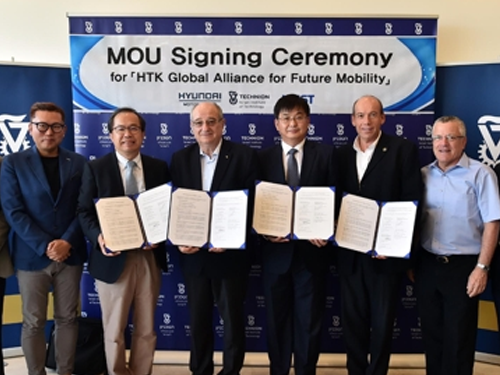 KAIST Partners with Technion and Hyundai Motors for Future Mobility Technology Development
(KAIST Associate Vice President of Research Joung-Ho Kim(third from left) poses with Technion President Pereta Lavie and CTO Tae Won Im of Hyundai Motors)
KAIST has partnered with the Israel Institute of Technology, Technion, and Hyundai Motors to take the lead in the field of future mobility technologies. The three parties signed a consortium of global alliance for future mobility partnership at Technion on Sept. 5. KAIST Associate Vice President of Research Kim Joung-Ho, Hyundai Motor’s Central Advanced Research and Engineering CTO Tae Won Lim, and Technion President Peretz Lavie signed the MOU.
The three parties agreed to conduct joint research on hi-tech mobility areas including self-driving systems, cyber security, and AI in mobility. With the signing of the consortium, KAIST's technology in AI, semiconductors, and autonomous cars will produce synergy with Technion’s connected car solutions, advancing Hyundai Motor's competitiveness in the future mobility market.
In addition to the consortium, the three parties will set-up a startup consulting committee, which will provide consulting services for nurturing venture startups with creative ideas and outstanding technological prowess in their host countries.
2017.09.07 View 7114
KAIST Partners with Technion and Hyundai Motors for Future Mobility Technology Development
(KAIST Associate Vice President of Research Joung-Ho Kim(third from left) poses with Technion President Pereta Lavie and CTO Tae Won Im of Hyundai Motors)
KAIST has partnered with the Israel Institute of Technology, Technion, and Hyundai Motors to take the lead in the field of future mobility technologies. The three parties signed a consortium of global alliance for future mobility partnership at Technion on Sept. 5. KAIST Associate Vice President of Research Kim Joung-Ho, Hyundai Motor’s Central Advanced Research and Engineering CTO Tae Won Lim, and Technion President Peretz Lavie signed the MOU.
The three parties agreed to conduct joint research on hi-tech mobility areas including self-driving systems, cyber security, and AI in mobility. With the signing of the consortium, KAIST's technology in AI, semiconductors, and autonomous cars will produce synergy with Technion’s connected car solutions, advancing Hyundai Motor's competitiveness in the future mobility market.
In addition to the consortium, the three parties will set-up a startup consulting committee, which will provide consulting services for nurturing venture startups with creative ideas and outstanding technological prowess in their host countries.
2017.09.07 View 7114 -
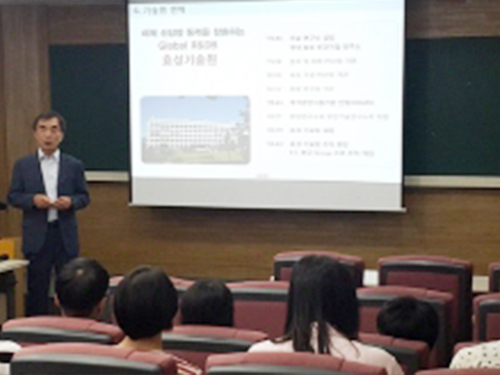 Hyosung R&DB Labs to Teach Special Class on High Molecule Chemistry for the Fall Semester
The Department of Chemistry in collaboration with the Hyosung Group’s R&DB Labs will open a ‘special class on high molecule chemistry’ for Masters and Ph.D. candidates. The class, led by researchers at Hyosung’s R&D think tank, will provide the latest market and technology trends in the molecule chemical industry during the fall semester.
Hyosung joined this special industry program in an effort to enhance students’ hands-on understanding of new technologies that will emerge in the global market. During the semester, Hyosung plans to present the technology portfolios on their brand new materials of TAC film, membrane, and carbon fiber as well as the existing products leading the world in market share such as spandex, tire cords.
Hyosung plans to recruit students who previously took courses led by Hyosung researchers. President Tu-Won Chang of Hyosung R&DB said, “This program is designed to foster highly qualified R&D personnel especially catering to our company’s needs and market demands. We will continue to share our company’s market analysis and R&D know-how with outstanding universities.
2017.09.07 View 5715
Hyosung R&DB Labs to Teach Special Class on High Molecule Chemistry for the Fall Semester
The Department of Chemistry in collaboration with the Hyosung Group’s R&DB Labs will open a ‘special class on high molecule chemistry’ for Masters and Ph.D. candidates. The class, led by researchers at Hyosung’s R&D think tank, will provide the latest market and technology trends in the molecule chemical industry during the fall semester.
Hyosung joined this special industry program in an effort to enhance students’ hands-on understanding of new technologies that will emerge in the global market. During the semester, Hyosung plans to present the technology portfolios on their brand new materials of TAC film, membrane, and carbon fiber as well as the existing products leading the world in market share such as spandex, tire cords.
Hyosung plans to recruit students who previously took courses led by Hyosung researchers. President Tu-Won Chang of Hyosung R&DB said, “This program is designed to foster highly qualified R&D personnel especially catering to our company’s needs and market demands. We will continue to share our company’s market analysis and R&D know-how with outstanding universities.
2017.09.07 View 5715 -
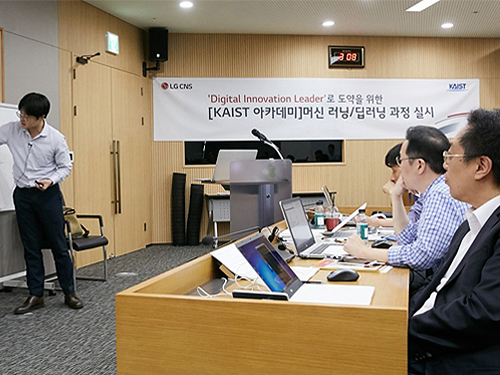 KAIST AI Academy for LG CNS Employees
The Department of Industrial & Systems Engineering (Graduate School of Knowledge Service Engineering) at KAIST has collaborated with LG CNS to start a full-fledged KAIST AI Academy course after the two-week pilot course for employees of LG CNS, a Korean company specializing in IT services.
Approximately 100 employees participated in the first KAIST AI Academy course held over two weeks from August 24 to September 1. LG CNS is planning to enroll a total of 500 employees in this course by the end of the year.
Artificial intelligence is widely recognized as essential technology in various industries. In that sense, the KAIST AI Academy course was established to reinforce both the AI technology and the business ability of the company. In addition, it aims at leading employees to develop new business using novel technologies. The main contents of this course are as follows: i) discussing AI technology development and its influence on industries; ii) understanding AI technologies and acquiring the major technologies applicable to business; and iii) introducing cases of AI applications and deep learning.
During the course, seven professors with expertise in AI deep learning from the Department of Industrial & Systems Engineering (Graduate School of Knowledge Service Engineering), including Jae-Gil Lee and Jinkyoo Park will be leading the class, including practical on-site educational programs.
Based on the accumulated business experience integrated with the latest AI technology, LG CNS has been making an effort to find new business opportunities to support companies that are hoping to make digital innovations.
The company aims to reinforce the AI capabilities of its employees and is planning to upgrade the course in a sustainable manner. It will also foster outside manpower by expanding the AI education to its clients who pursue manufacturing reinforcement and innovation in digital marketing.
Seong Wook Lee, the Director of the AI and Big Data Business Unit said, “As AI plays an important role in business services, LG CNS decided to open the KAIST AI Academy course to deliver better value to our clients by incorporating our AI-based business cases and KAIST’s up-to-date knowledge.”
2017.09.06 View 8142
KAIST AI Academy for LG CNS Employees
The Department of Industrial & Systems Engineering (Graduate School of Knowledge Service Engineering) at KAIST has collaborated with LG CNS to start a full-fledged KAIST AI Academy course after the two-week pilot course for employees of LG CNS, a Korean company specializing in IT services.
Approximately 100 employees participated in the first KAIST AI Academy course held over two weeks from August 24 to September 1. LG CNS is planning to enroll a total of 500 employees in this course by the end of the year.
Artificial intelligence is widely recognized as essential technology in various industries. In that sense, the KAIST AI Academy course was established to reinforce both the AI technology and the business ability of the company. In addition, it aims at leading employees to develop new business using novel technologies. The main contents of this course are as follows: i) discussing AI technology development and its influence on industries; ii) understanding AI technologies and acquiring the major technologies applicable to business; and iii) introducing cases of AI applications and deep learning.
During the course, seven professors with expertise in AI deep learning from the Department of Industrial & Systems Engineering (Graduate School of Knowledge Service Engineering), including Jae-Gil Lee and Jinkyoo Park will be leading the class, including practical on-site educational programs.
Based on the accumulated business experience integrated with the latest AI technology, LG CNS has been making an effort to find new business opportunities to support companies that are hoping to make digital innovations.
The company aims to reinforce the AI capabilities of its employees and is planning to upgrade the course in a sustainable manner. It will also foster outside manpower by expanding the AI education to its clients who pursue manufacturing reinforcement and innovation in digital marketing.
Seong Wook Lee, the Director of the AI and Big Data Business Unit said, “As AI plays an important role in business services, LG CNS decided to open the KAIST AI Academy course to deliver better value to our clients by incorporating our AI-based business cases and KAIST’s up-to-date knowledge.”
2017.09.06 View 8142 -
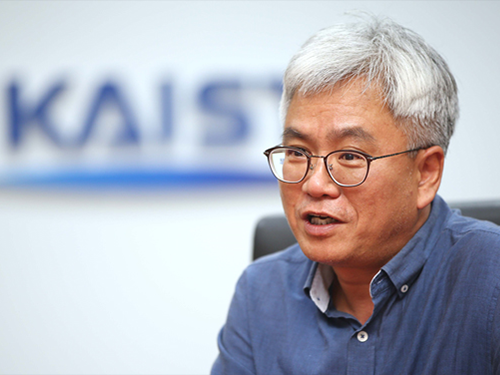 Professor Dae-Sik Im to Head the Science, Technology and Innovation Office at the Ministry of Science & ICT
(Professor Dae-Sik Im of the Department of Biological Sciences)
Professor Dae-Sik Im of the Department of Biological Sciences, a renowned molecular cell biologist, was named to head the Science, Technology and Innovation Office in the Ministry of Science and ICT on August 31. He will be responsible for the oversight of national R&D projects as well as budget deliberation. Joining the KAIST faculty in 2002, he led the Creative Research Center of Cell Division and Differentiation at KAIST.
Announcing the nomination of Professor Im, Cheong Wa Dae spokesman Park Soo-Hyun said, “Professor Im will be the best person to lead the innovation of the research infrastructure system for basic research studies. We believe that his expertise and leadership will make a significant impact in enhancing the nation’s science and technology competitiveness. This vice minister position in the Ministry of Science and ICT was newly created in an effort to enhance national science and technology initiatives by President Moon Jae-In.
Professor Im said at the news conference, “I would like to make a sustainable, as well as credible, system ensuring the ingenuity of scientists in Korean labs. To this end, I will make every effort to enhance Korea’s innovative research environment in a way to maximize research achievements.”
2017.09.03 View 10231
Professor Dae-Sik Im to Head the Science, Technology and Innovation Office at the Ministry of Science & ICT
(Professor Dae-Sik Im of the Department of Biological Sciences)
Professor Dae-Sik Im of the Department of Biological Sciences, a renowned molecular cell biologist, was named to head the Science, Technology and Innovation Office in the Ministry of Science and ICT on August 31. He will be responsible for the oversight of national R&D projects as well as budget deliberation. Joining the KAIST faculty in 2002, he led the Creative Research Center of Cell Division and Differentiation at KAIST.
Announcing the nomination of Professor Im, Cheong Wa Dae spokesman Park Soo-Hyun said, “Professor Im will be the best person to lead the innovation of the research infrastructure system for basic research studies. We believe that his expertise and leadership will make a significant impact in enhancing the nation’s science and technology competitiveness. This vice minister position in the Ministry of Science and ICT was newly created in an effort to enhance national science and technology initiatives by President Moon Jae-In.
Professor Im said at the news conference, “I would like to make a sustainable, as well as credible, system ensuring the ingenuity of scientists in Korean labs. To this end, I will make every effort to enhance Korea’s innovative research environment in a way to maximize research achievements.”
2017.09.03 View 10231 -
 KAIST to Open the Meditation Research Center
KAIST announced that it will open its Meditation Research Center next June. The center will serve as a place for the wellness of KAIST community as well as for furthering the cognitive sciences and its relevant convergence studies.
For facilitating the center, KAIST signed an MOU with the Foundation Academia Platonica in Seoul, an academy working for enriching the humanities and insight meditation on Aug.31. The Venerable Misan, a Buddhist monk well-known for his ‘Heart Smile Meditation’ program, will head the center.
The center will also conduct convergence research on meditation, which will translate into brain imaging, cognitive behavior, and its psychological effects. Built upon the research, the center expects to publish textbooks on meditation and will distribute them to the public and schools in an effort to widely disseminate the benefits of meditation.
As mindful meditation has become mainstream and more extensively studied, growing evidence suggests multiple psychological and physical benefits of these mindfulness exercises as well as for similar practices. Mind-body practices like meditation have been shown to reduce the body’s stress response by strengthening the relaxation response and lowering stress hormones.
The Venerable Misan, a Ph.D in philosophy from Oxford University, also serves as the director of the Sangdo Meditation Center and a professor at Joong-Ang Sangha University, a higher educational institution for Buddhist monks.
Monk Misan said that meditation will play a crucial part in educating creative students with an empathetic mindset. He added, “Hi-tech companies in Silicon Valley such as Google and Intel have long introduced meditation programs for stress management. Such practices will enhance the wellness of employees as well as their working efficiency.”
President Sung-Chul Shin said of the opening of the center, “From long ago, many universities in foreign countries including Havard, Stanford, Oxfor universities and the Max Planck Institute in Germany have applied scientific approaches to meditation and installed meditation centers. I am pleased to open our own center next year and I believe that it will bring more diverse opportunities for advancing convergent studies in AI and cognitive sciences.
2017.08.31 View 6939
KAIST to Open the Meditation Research Center
KAIST announced that it will open its Meditation Research Center next June. The center will serve as a place for the wellness of KAIST community as well as for furthering the cognitive sciences and its relevant convergence studies.
For facilitating the center, KAIST signed an MOU with the Foundation Academia Platonica in Seoul, an academy working for enriching the humanities and insight meditation on Aug.31. The Venerable Misan, a Buddhist monk well-known for his ‘Heart Smile Meditation’ program, will head the center.
The center will also conduct convergence research on meditation, which will translate into brain imaging, cognitive behavior, and its psychological effects. Built upon the research, the center expects to publish textbooks on meditation and will distribute them to the public and schools in an effort to widely disseminate the benefits of meditation.
As mindful meditation has become mainstream and more extensively studied, growing evidence suggests multiple psychological and physical benefits of these mindfulness exercises as well as for similar practices. Mind-body practices like meditation have been shown to reduce the body’s stress response by strengthening the relaxation response and lowering stress hormones.
The Venerable Misan, a Ph.D in philosophy from Oxford University, also serves as the director of the Sangdo Meditation Center and a professor at Joong-Ang Sangha University, a higher educational institution for Buddhist monks.
Monk Misan said that meditation will play a crucial part in educating creative students with an empathetic mindset. He added, “Hi-tech companies in Silicon Valley such as Google and Intel have long introduced meditation programs for stress management. Such practices will enhance the wellness of employees as well as their working efficiency.”
President Sung-Chul Shin said of the opening of the center, “From long ago, many universities in foreign countries including Havard, Stanford, Oxfor universities and the Max Planck Institute in Germany have applied scientific approaches to meditation and installed meditation centers. I am pleased to open our own center next year and I believe that it will bring more diverse opportunities for advancing convergent studies in AI and cognitive sciences.
2017.08.31 View 6939 -
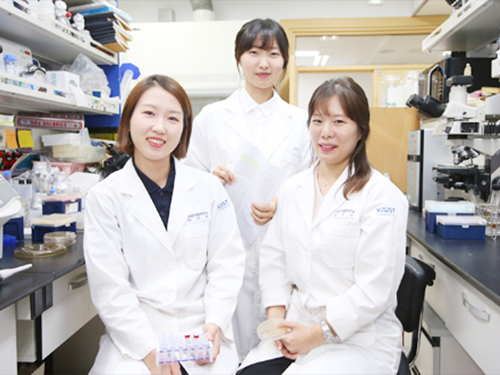 KAIST Researchers Receive Awards at the 13th Asian Congress on Biotechnology
(From left: Seon Young Park, Dr. So Young Choi, and Yoojin Choi)
Researchers in the laboratory of KAIST Distinguished Professor Sang Yup Lee from the Department of Chemical and Biomolecular Engineering swept awards at the 13th Asian Congress on Biotechnology held in Thailand last month. The conference awarded a total of eight prizes in the areas of best research and best poster presentation. This is an exceptional case in which members of one research team received almost half of the awards at an international conference.
Dr. So Young Choi received the Best Research Award, while Ph.D. candidates Yoojin Choi and Seon Young Park each received the Best Poster Presentation Award at the conference held in Khon Kaen, Thailand from July 23 to 27.
The Asian Congress on Biotechnology is an international conference in which scientists and industry experts in Asia and from around the world gather to present recent research findings in the field of biotechnology. At the conference, around 400 researchers in biotechnology from 25 countries, including Korea, gathered to present and discuss various research findings under the theme of “Bioinnovation and Bioeconomy.”
Distinguished Professor Sang Yup Lee attended the conference to give the opening plenary lecture on the topic of ‘Systems Strategies in Biotechnology.’ Professor Lee announced, “I have attended international conferences with students for the last 20 years, but this is the first in which my team received three awards at an international conference that only honors a total of eight awards, three for Best Research and five for Best Presentation.”
Dr. Choi presented research results on poly (lactate-co-glycolate) (PLGA) synthesis through a biological method using micro-organisms and received the Best Research Award. PLGA is a random copolymer of DL-lactic and glycolic acids and is a biopolymer widely used for biomedical applications. PLGA is biodegradable, biocompatible, and nontoxic, and thus has been approved by the US Food and Drug Administration (FDA) for its use in implants, drug delivery, and sutures.
Dr. Choi’s research was deemed to be innovative for synthesizing PLGA from glucose and xylose in cells through metabolic engineering of E.Coli. Dr. Choi received her Ph.D. under the supervision of Distinguished Professor Lee this February and is currently conducting post-doc research.
Ph.D. candidate Choi presented her research on the use of recombinant E.Coli for the biological synthesis of various nanoparticles and received the Best Poster Presentation award. Choi used recombinant E.Coli-expressing proteins and peptides that adsorb to heavy metals to biologically synthesize diverse metal nanoparticles such as single-nanoparticle including gold and silver, quantum dots, and magnetic nanoparticles for the first time. The synthesized nanoparticles can be used in the fields of bio-imaging, diagnosis, environment, and energy.
Ph.D. candidate Park, who also received the Best Poster Presentation award, synthesized and increased production of astanxanthin, a strong antioxidant found in nature, in E.Coli using metabolic engineering. Astanxanthin is a carotenoid pigment found in salmon and shrimp that widely used in health products and cosmetics.
2017.08.01 View 15969
KAIST Researchers Receive Awards at the 13th Asian Congress on Biotechnology
(From left: Seon Young Park, Dr. So Young Choi, and Yoojin Choi)
Researchers in the laboratory of KAIST Distinguished Professor Sang Yup Lee from the Department of Chemical and Biomolecular Engineering swept awards at the 13th Asian Congress on Biotechnology held in Thailand last month. The conference awarded a total of eight prizes in the areas of best research and best poster presentation. This is an exceptional case in which members of one research team received almost half of the awards at an international conference.
Dr. So Young Choi received the Best Research Award, while Ph.D. candidates Yoojin Choi and Seon Young Park each received the Best Poster Presentation Award at the conference held in Khon Kaen, Thailand from July 23 to 27.
The Asian Congress on Biotechnology is an international conference in which scientists and industry experts in Asia and from around the world gather to present recent research findings in the field of biotechnology. At the conference, around 400 researchers in biotechnology from 25 countries, including Korea, gathered to present and discuss various research findings under the theme of “Bioinnovation and Bioeconomy.”
Distinguished Professor Sang Yup Lee attended the conference to give the opening plenary lecture on the topic of ‘Systems Strategies in Biotechnology.’ Professor Lee announced, “I have attended international conferences with students for the last 20 years, but this is the first in which my team received three awards at an international conference that only honors a total of eight awards, three for Best Research and five for Best Presentation.”
Dr. Choi presented research results on poly (lactate-co-glycolate) (PLGA) synthesis through a biological method using micro-organisms and received the Best Research Award. PLGA is a random copolymer of DL-lactic and glycolic acids and is a biopolymer widely used for biomedical applications. PLGA is biodegradable, biocompatible, and nontoxic, and thus has been approved by the US Food and Drug Administration (FDA) for its use in implants, drug delivery, and sutures.
Dr. Choi’s research was deemed to be innovative for synthesizing PLGA from glucose and xylose in cells through metabolic engineering of E.Coli. Dr. Choi received her Ph.D. under the supervision of Distinguished Professor Lee this February and is currently conducting post-doc research.
Ph.D. candidate Choi presented her research on the use of recombinant E.Coli for the biological synthesis of various nanoparticles and received the Best Poster Presentation award. Choi used recombinant E.Coli-expressing proteins and peptides that adsorb to heavy metals to biologically synthesize diverse metal nanoparticles such as single-nanoparticle including gold and silver, quantum dots, and magnetic nanoparticles for the first time. The synthesized nanoparticles can be used in the fields of bio-imaging, diagnosis, environment, and energy.
Ph.D. candidate Park, who also received the Best Poster Presentation award, synthesized and increased production of astanxanthin, a strong antioxidant found in nature, in E.Coli using metabolic engineering. Astanxanthin is a carotenoid pigment found in salmon and shrimp that widely used in health products and cosmetics.
2017.08.01 View 15969 -
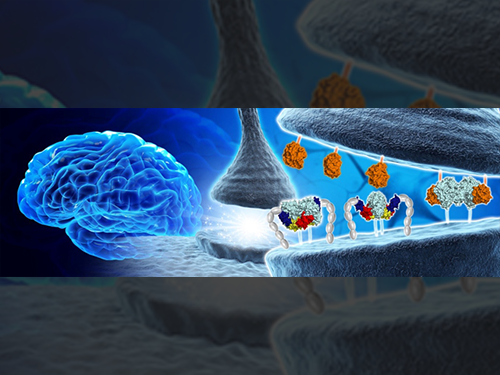 Structural Insights into the Modulation of Synaptic Adhesion by MDGA for Synaptogenesis
Synapses connected by various synaptic adhesion molecules are communication spaces between neurons for transmitting information. Among various synaptic adhesion molecules, neuroligins are arguably the most widely studied class of postsynaptic adhesion molecules, which mainly interact with presynaptic neurexins to induce excitatory or inhibitory synapse development. Recently, the membrane-associated mucin (MAM) domain-containing GPI anchor protein 1 (MDGA1) has been characterized as a key suppressor of Neuroligin-2/Neurexin-1β-mediated inhibitory synapse development, but how it acts remains a mystery.
In a recent issue of Neuron, published on June 21, 2017, a research team led by Professor Ho Min Kim at the Graduate School of Medical Science and Engineering of KAIST reported the three-dimensional structure of MDGA1/Neuroligin-2 complex and mechanistic insights into how MDGAs negatively modulate synapse development governed by Neurexins/Neuroligins trans -synaptic adhesion complex.
MDGA1 consists of six Ig-like domains, fibronectin type III repeat domain, and MAM domain . The crystal structure of MDGA1/Neuroligin-2 complex reveals that they form the 2:2 hetero-tetrameric complex and only the Ig1-Ig2 domains of MDGA1 are involved in interactions with Neuroligin-2. The structural comparison between the MDGA1/Neuroligin-2 and Neurexin-1β/Neuroligin-1 complexes intriguingly indicates that the Neuroligin-2 region binding to MDGA1 largely overlaps with that of Neurexin-1β, but the interaction interface of the MDGA1/Neuroligin-2 complex is much larger than that of the Neurexin-1β/Neuroligin-1 complex. This explains why Neuroligin-2 binds stronger to MDGA1 than Neurexin-1β, and how the favored MDGA1 binding to Neuroligin-2 sterically blocks the interaction between Neuroligin-2 and Neurexin-1β, which is critical for the suppression of inhibitory synapse development.
“Although we found that MDGA Ig domains (Ig 1 and Ig 2) are sufficient to form a complex with NL2, other extracellular domains, including Ig 3–6, FN III, and MAM domains, may also contribute to stable cis-interactions between MDGA1 and Neuroligin-2 by providing conformational flexibility. Therefore, further structural analysis of full-length MDGA will be required,” Professor Kim said.
Neuroligin-2 specifically promotes the development of inhibitory synapses, whereas neuroligin-1 promotes the development of excitatory synapses. Recently, not only MDGA1, but also MDGA2 have emerged as synaptic regulators for the development of excitatory or inhibitory synapses. In vitro biochemical analysis in this research clearly demonstrates that Neuroligin-1 and Neuroligin-2 bind to both MDGA1 and MDGA2 with comparable affinity. However, pull-down assays using detergent-solubilized mouse brain membrane fractions show the specific interaction of MDGA1 with Neuroligin-2, but not with Neuroligin-1. “This suggests that unidentified processes may dictate the selective association of MDGA1 with Neuroligin-2 in vivo , ” explained Professor Jaewon Ko at the Daegu Gyeongbuk Institute of Science and Technology (DGIST).
A balance between excitatory and inhibitory synapses is crucial to healthy cognition and behavior. Mutations in neuroligins, neurexins, and MDGAs, which can disrupt the excitatory/inhibitory balance, are associated with neuropsychiatric diseases such as autism and schizophrenia. Jung A Kim at KAIST, first author in this study, said, “Our discovery from integrative investigations are an important first step both for a better understanding of Neuroligin/Neurexin synaptic adhesion pathways and MDGA-mediated regulation of synapse development as well as the development of potential new therapies for autism, schizophrenia, and epilepsy.”
2017.07.10 View 9572
Structural Insights into the Modulation of Synaptic Adhesion by MDGA for Synaptogenesis
Synapses connected by various synaptic adhesion molecules are communication spaces between neurons for transmitting information. Among various synaptic adhesion molecules, neuroligins are arguably the most widely studied class of postsynaptic adhesion molecules, which mainly interact with presynaptic neurexins to induce excitatory or inhibitory synapse development. Recently, the membrane-associated mucin (MAM) domain-containing GPI anchor protein 1 (MDGA1) has been characterized as a key suppressor of Neuroligin-2/Neurexin-1β-mediated inhibitory synapse development, but how it acts remains a mystery.
In a recent issue of Neuron, published on June 21, 2017, a research team led by Professor Ho Min Kim at the Graduate School of Medical Science and Engineering of KAIST reported the three-dimensional structure of MDGA1/Neuroligin-2 complex and mechanistic insights into how MDGAs negatively modulate synapse development governed by Neurexins/Neuroligins trans -synaptic adhesion complex.
MDGA1 consists of six Ig-like domains, fibronectin type III repeat domain, and MAM domain . The crystal structure of MDGA1/Neuroligin-2 complex reveals that they form the 2:2 hetero-tetrameric complex and only the Ig1-Ig2 domains of MDGA1 are involved in interactions with Neuroligin-2. The structural comparison between the MDGA1/Neuroligin-2 and Neurexin-1β/Neuroligin-1 complexes intriguingly indicates that the Neuroligin-2 region binding to MDGA1 largely overlaps with that of Neurexin-1β, but the interaction interface of the MDGA1/Neuroligin-2 complex is much larger than that of the Neurexin-1β/Neuroligin-1 complex. This explains why Neuroligin-2 binds stronger to MDGA1 than Neurexin-1β, and how the favored MDGA1 binding to Neuroligin-2 sterically blocks the interaction between Neuroligin-2 and Neurexin-1β, which is critical for the suppression of inhibitory synapse development.
“Although we found that MDGA Ig domains (Ig 1 and Ig 2) are sufficient to form a complex with NL2, other extracellular domains, including Ig 3–6, FN III, and MAM domains, may also contribute to stable cis-interactions between MDGA1 and Neuroligin-2 by providing conformational flexibility. Therefore, further structural analysis of full-length MDGA will be required,” Professor Kim said.
Neuroligin-2 specifically promotes the development of inhibitory synapses, whereas neuroligin-1 promotes the development of excitatory synapses. Recently, not only MDGA1, but also MDGA2 have emerged as synaptic regulators for the development of excitatory or inhibitory synapses. In vitro biochemical analysis in this research clearly demonstrates that Neuroligin-1 and Neuroligin-2 bind to both MDGA1 and MDGA2 with comparable affinity. However, pull-down assays using detergent-solubilized mouse brain membrane fractions show the specific interaction of MDGA1 with Neuroligin-2, but not with Neuroligin-1. “This suggests that unidentified processes may dictate the selective association of MDGA1 with Neuroligin-2 in vivo , ” explained Professor Jaewon Ko at the Daegu Gyeongbuk Institute of Science and Technology (DGIST).
A balance between excitatory and inhibitory synapses is crucial to healthy cognition and behavior. Mutations in neuroligins, neurexins, and MDGAs, which can disrupt the excitatory/inhibitory balance, are associated with neuropsychiatric diseases such as autism and schizophrenia. Jung A Kim at KAIST, first author in this study, said, “Our discovery from integrative investigations are an important first step both for a better understanding of Neuroligin/Neurexin synaptic adhesion pathways and MDGA-mediated regulation of synapse development as well as the development of potential new therapies for autism, schizophrenia, and epilepsy.”
2017.07.10 View 9572